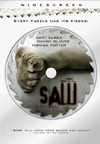Saw
Lions Gate Home Entertainment
Cast: Cary Elwes, Danny Glover
Extras: Commentary Track, Featurette, Music Videos, Gallery, Trailers
Rating:
It’s been almost ten years since "Se7en" hit the theaters, and directors have been trying to recreate the essence of that film ever since. "Saw" certainly has a strong enough hook to set it apart from many imitators, but some serious flaws in the storyline and a few lapses in judgment keep it a few notches below the classics of the genre.
It starts off in a filthy, abandoned room, with two men (Carey Elwes and writer Leigh Whannel) chained to pipes on opposite sides. In the center of the room is a dead man, who holds a gun in one hand and a tape recorder in the other. Neither of the men remember how they got to this room, or have any idea of why they’re here, but a bit of investigating reveals that they’re the latest victim of the killer known as "Jigsaw." Jigsaw’s modus operandi involves constructing elaborate and grizzly puzzles for his victims; solving them involves a severe breach of traditional morality and a confrontation with personal demons. As Jigsaw lets us know, this is to test how much his victims value their lives. (Why are serial killers always trying to teach us things? Lately, they’ve gotten worse than Robin Williams.)
The film unravels through a series of flashbacks as we learn more about Jigsaw and the relationship of the two latest victims. The requisite number of plot twists and turns are included, but it often seems that the film is more concerned with being clever than following its own internal logic. Repeat viewings bear this out, as the construction is much less plausible the second time through, requiring a substantial leap of faith to make things work out.
Even with these flaws, "Saw" is solid, bloody fun, and manages to push the boundaries further than Hollywood studios usually allow. Occasionally, this involves a lapse in taste – wallowing in a child’s terror is seldom appropriate – but most often, the violence is creative and visceral enough for the film to get away with it. Still, this isn’t a film for those who believe everything distasteful should happen off-screen.
Lions Gate’s DVD offers an excellent transfer and several outstanding sound mixes, but the disc isn’t without its problems. First of all, someone in Lions Gate’s Quality Control department needs to pay closer attention to their DVD sleeves – the <$PS,widescreen> version of this disc tells us, ominously, that the film is "Presented in full screen to fit your standard TV screen." Fortunately, the <$PS,widescreen> version of the disc is actually in <$16x9,anamorphic> <$PS,widescreen>.
Better still, this <$16x9,anamorphic> <$PS,widescreen> transfer is top-notch. The grays, browns, and deep blues that dominate the color palette are rendered with great depth and clarity, and the level of grain is just high enough to give the picture a natural film-like quality. The finer details suffer slightly for this, but it’s a necessary trade-off given the visual style of the film. There’s almost nothing in the way of visible edge enhancement or other compression errors to distract.
As far as the soundtracks go, you’ve got your choice between <$DD,Dolby Digital> 5.1 EX and <$DTS,DTS> 6.1, and it’s hard to go wrong with either option. Both feature an aggressive mix with a high degree of activity from the rear channels. Panning effects are prevalent across the front of the soundstage, and the strength of the dynamic range is obvious throughout. In case you’ve forgotten, this disc will help you to remember why you bought your surround sound system.
The list of extra features sure looks impressive, but you don’t have to dig to deep to figure out there’s not much here. The <$commentary,commentary track>, with Director James Wan and writer/star Leigh Whannell, is pointless and even less serious than these things usually are. They spend most of the time joking around, almost never delving into the aesthetic and creative decisions that went into making the film. The "making-of" featurette is even worse – it runs a grand total of two and a half minutes. Other than that, there are two versions of the music video for Fear Factory’s "Bite the Hand That Bleeds You," a behind-the-scenes featurette to go along with them, and a poster gallery. Last up is a sequence of theatrical trailers and TV spots. The trailer second is presented in <$16x9,anamorphic> <$PS,widescreen>; the rest are <$PS,letterboxed>.
Although the transfer and the soundtracks are as good as could be hoped for, the disc still has the feeling of being hurriedly put together, from the errors on the sleeve to the underwhelming extra features. But it you’re a fan of serial-killer films in particular or horror in general, there’s still enough to make this disc worth a look. While the film as a whole doesn’t always work, some individual scenes are as chilling as anything committed to celluloid; that goes a long way towards making up for the flaws in the storyline.







